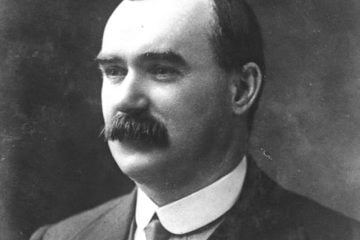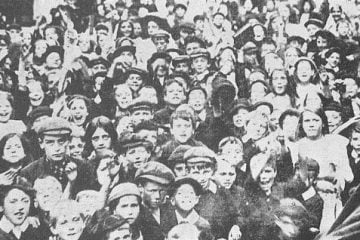Karl Marx was born on May 5, 1818 (New Style), in the city of Trier (Rhenish Prussia). He went on to make the greatest single contribution to the working class struggle against capitalism. He was a great theoretician and an indefatigable activist. His ideas live on today, more relevant today than they have ever been. After leaving school in Trier, Marx went on to university first in Bonn and then later in Berlin. As a student Marx was a follower of the great German philosopher Hegel’s ideas. In Berlin, he belonged to a group of “Left Hegelians” who drew revolutionary conclusions from Hegel’s philosophy.
After graduating from university, Marx moved to Bonn. At this time Left Hegelian views were making rapid headway in Germany. Feuerbach, in particular, developed a criticism of theology and began to develop materialist ideas. The ideas of Feuerbach had a profound effect on Marx and the other Left Hegelians of the day. The year 1843 saw the appearance of his book Principles of the Philosophy of the Future. “We all became at once Feuerbachians”, Engels wrote some years later.
It was around this time that a radical group in the Rhineland, who were in touch with the Left Hegelians, founded an opposition newspaper called Rheinische Zeitung in Cologne. The first issue appeared on January 1, 1842, and in October 1842 Marx became its editor-in-chief and moved from Bonn to Cologne. The paper had begun with a revolutionary-democratic outlook and this became more and more pronounced under Marx’s direction. As a consequence the government imposed a series of censorship measures against the paper, and then on January 1 1843 decided to suppress it altogether. The Rheinische Zeitung suspended publication in March 1843, the same year Marx got married.
In the autumn of 1843, Marx moved to Paris, and In September 1844, Frederick Engels came to Paris for a few days, and from that time on became Marx’s closest friend and political collaborator. The names Marx and Engels have since become inseparable, almost one person. Immediately the two men proceeded to take a most active part in the hectic life of the revolutionary groups in Paris. Proudhon’s anarchist ideas were quite popular amongst some of these groups. Marx answered them thoroughly and meticulously in his Poverty of Philosophy, in 1847, using the method which one finds time and again in the writings of Marx, withering criticism backed up by facts, and substantial quotations from the writings of those he criticises. Unfortunately this rigorous and honest approach has not been shared by that countless number who have written spurious works in an attempt to rubbish Marx’s ideas ever since.
Marx and Engels together waged an energetic struggle against the various doctrines of petty-bourgeois socialism, anarchism and so on, in an effort to place the ideas of socialism on a scientific footing. This was perhaps Marx and Engels’ greatest achievement, to pull the idea of socialism down from the stratosphere to earth and the real world of class society. Socialism was no longer to be just a lofty ideal, but the product of a material struggle between the classes, a product of historical development. The ideas of Marx and Engels are scientific socialism.
These revolutionary ideas inevitably drew the attention of the authorities, already shaken by the onward march of revolt across Europe. At the insistent request of the Prussian government, Marx was banished from Paris in 1845, as a dangerous revolutionary. He went to Brussels. In the spring of 1847 Marx and Engels joined a secret propaganda society called the Communist League. They took a prominent part in the League’s Second Congress in London in November 1847. As a result they were charged with drawing up the document which became The Communist Manifesto.
On the outbreak of the Revolution of February 1848, Marx was banished from Belgium. He returned to Paris and then, after the March Revolution, he went to Cologne, Germany, where Neue Rheinische Zeitung was published from June 1 1848 to May 19 1849, with Marx as editor-in-chief. His ideas were being daily confirmed by the course of the revolutionary events of 1848-49. The victorious counter-revolution instigated court proceedings against Marx. He was acquitted on February 9 1849 but then banished from Germany on May 16 1849. From Germany Marx travelled on to Paris, was again banished after the demonstration of June 13, 1849, and then went to London, where he lived until his death.
His life as a political exile was a very hard one, as the correspondence between Marx and Engels clearly reveals. Poverty weighed heavily on Marx and his family; had it not been for Engels’ constant and selfless financial aid, Marx would not only have been unable to complete Capital but would have inevitably have been crushed by want.
Capital, completed after Marx’s death in the main due to the tireless efforts of his comrade Engels, is probably the best known of Marx’s writings. In these three volumes, which represent capitalism’s genome, there is more than enough argument to convince anyone of the inability of the capitalist system to solve its inherent problems.
In London in 1864, on September 28, the International Working Men’s Association – the celebrated First International – was founded. Marx was the heart and soul of this organisation, the author of its first Address and of a host of resolutions, declaration and manifestoes.
Through its energetic work, the International established links with the British trade unions. The first national conference of trade unions in Sheffield in July 1866 passed a resolution urging trade unions to join the International Working Men’s Association. In 1867 more than 30 trade unions, numbering around 50,000 members, were affiliated. Sections of the International were quickly established in the United States and on the continent of Europe, including Russia.
As the International spread its influence, it attracted the anarchists who played a negative and disruptive role within its ranks. Bakunin, the anarchist leader, intrigued at every stage to subvert the International and undermine its leadership, beginning with Marx. Marx fought back to defend the ideas of scientific socialism against this pseudo-revolutionary sectarianism.
The Paris Commune (18 March to 29 May, 1871) saw the workers of Paris seize political power. Marx and the International rallied to its defence. The Communards “stormed heaven”, to use Marx’s expression, and established the embryo of the first workers’ state in history. Marx hailed the Commune, and defended it in the face of conservatism from the English trade union leaders in the International.
Marx’s health was undermined by his strenuous work in the International and his still more strenuous theoretical studies and writing. He continued to work tirelessly on the question of political economy and on the completion of Capital, for which he collected a mass of new material and studied a number of languages including Russian.
On December 2 1881 Marx’s wife died, and then on March 14 1883 Marx himself passed away peacefully in his armchair. He lies buried next to his wife at Highgate Cemetery in London.But his ideas live on to educate and inspire a new generation of class fighters all over the world. Karl Marx gave his whole life to this cause, sacrificing everything for the cause of the emancipation of the working class. Today, Marxist ideas are gaining ground.
In general in the hands of bourgeois academics the ideas of Marxism will be transformed and vulgarised into dead dogma. In the hands of the workers movement, inscribed on the banner of the youth, they will serve their true purpose. As Marx himself explained that purpose is to help not only to understand the world, but to change it.




0 Comments